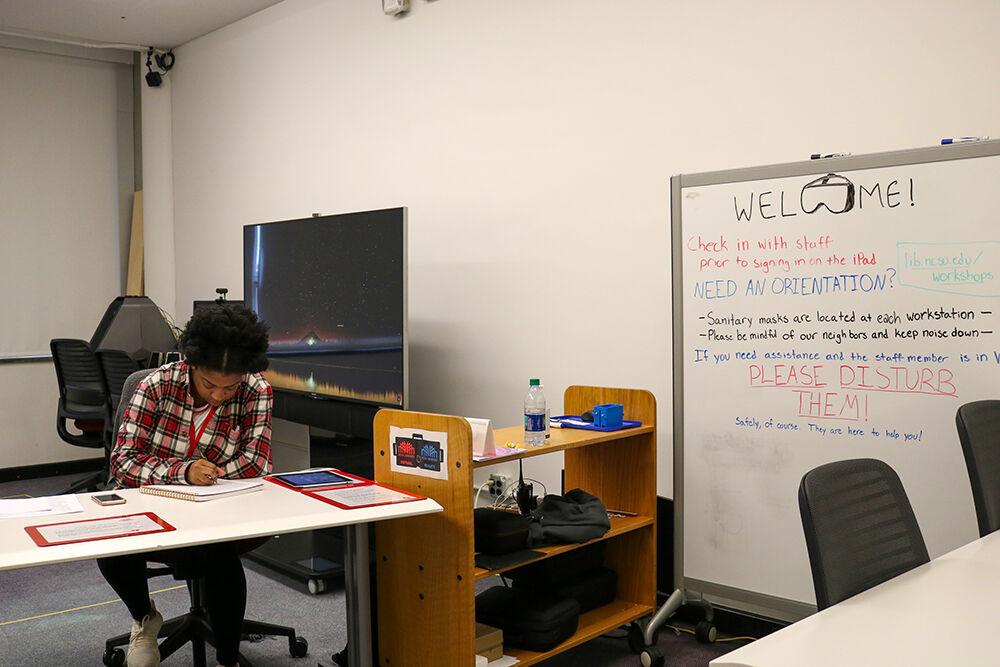Every year, University Libraries offers anywhere from 100 to 200 workshops on a variety of topics ranging from digital embroidery to citation management to Python programming language. Natalia Lopez, lead librarian for data instruction, said while many workshops have moved in person again, for others, the virtual format has been beneficial.
According to Lopez, most workshops are open to the public. Lopez said the workshops also act to highlight the expertise of the library support system and bring awareness to the resources that are available to the NC State community.
“We offer quite a number of workshops every semester that support a variety of needs around data analysis and methods for our student body and for our researchers,” Lopez said. “The goal of the workshop series is to introduce our community to a variety of information literacy needs, whether it’s around specific things like citation management [or] hands-on learning. So whether you’re using Makerspace technology or data for your research needs, the idea is to holistically support research across the board.”
Depending on how one-on-one a workshop is, Lopez said attendance can range from anywhere from four to over 30 people and moving the data and visualization workshops online has actually significantly increased attendance.
“Our Hunt and Hill folks often have to pick and choose which campus, and we have such demand from both populations, [moving online] has been really helpful,” Lopez said. “[For] the other departments or other series, it’s more helpful to be in person for some of the technologies. But it’s been really helpful for a lot of people to experiment and sort of see the kinds of things that we can offer.”
Tisha Mentnech, research librarian for life sciences and research metrics, said she has been teaching workshops for four semesters.
“The [workshops] that I teach focus on research metrics and research impact,” Mentnech said. “So how does the work that researchers, students, faculty and staff, whoever, get used within their fields and disciplines? I help them figure out what metrics to look at and track, as well as where to look at them, where to keep track of them themselves, and finding a way to leverage those to give the best image of themselves.”
Mentnech said they usually see graduate and postdoctoral attendees, with some faculty, staff and external attendees as well.
“[Moving online] has gone better for me, actually, because people are able to join more easily,” Mentnech said. “So with the graduate students and faculty and staff who would come in, it was harder to leave their labs or their research or whatever they’re doing. Since it’s online, it’s easier for them to join and come.”
While a lot of workshops are taught by University Libraries staff, Shaun Bennett, research librarian for business, education and data literacy, said the Peer Scholars program allows graduate students and postdoctoral scholars to teach workshops as well. He said this program began in fall 2017, and while the Peer Scholars workshops are online this semester, they may move back to in person next semester.
“The library’s workshop program is really incredibly diverse in what it offers and who it’s being offered by,” Bennett said. “Peer Scholars fits into this because librarians don’t necessarily have all the expertise, we don’t necessarily have time to become experts in everything. So what we do is we seek out grad students and postdoctoral scholars who have a skill or a talent or a tool … and then we work with them for the teaching process, so it gives them teaching experience, and we pay them a stipend for the workshop, which is unique to Peer Scholars. Then they can go in, teach this workshop multiple times in a semester and share that expertise with the campus.”
Bennett said Peer Scholars workshops have included in-depth literature review studies, MATLAB sessions and National Science Foundation grant writing workshops. He said students from every college except for the College of Veterinary Medicine have participated.
“One of the strengths of the program is that we’re inviting grad students and postdocs to teach about the things that they thought were difficult in their own area,” Bennett said. “We always encourage folks if they say, ‘Well, I’m not sure what I want to teach, but I know I want to be part of the program,’ we typically say, ‘What was a stumbling block for you? What part of the program was maybe not so great? How can you help alleviate that in the people that are coming after you?’ And it always works.”
To learn more and register for the workshops offered by University Libraries, students can view workshops by series and sign up for semesterly email updates.













